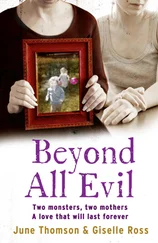She found her father in a ward with seven men. When he noticed her, he sat up, smoothing his bedclothes and smiling, as if she was someone he’d been told to please. But she had seen him first, through a gap in the curtains, his face slack and hollow, almost uninhabited, and even now, as she settled on the chair beside the bed, she thought the bones in his forehead showed too clearly through his skin: she could see the edges, the places where they joined.
‘Glade,’ he said. Then, turning to include the other men, he said, ‘My daughter.’ The men all came to life suddenly, nodding and smiling at the same time, like puppets.
‘Dad,’ she murmured, reproaching him.
‘Sorry. They’re not bad fellows, though.’
She took his hand, and he watched it being taken, as if it didn’t belong to him. ‘How are you?’ she said.
‘Oh, I’ll live.’ He gave her what was intended to be a jaunty grin, but his eyes seemed frightened.
‘Apparently they tried to call me,’ she said. ‘My phone wasn’t working.’
‘That’s all right. The Babbs looked after me.’
She couldn’t bring herself to ask him how he came to be lying in the field. Instead she simply held on to his hand and studied it. As a young girl she used to sit on his lap and learn his hand off by heart. The oval fingernails, the swollen veins. The dark-grey star-shaped mark on his left thumb, which he had always jokingly referred to as his tattoo (a boy had stabbed him with a fountain pen at school).
‘I slept in the caravan last night,’ she said.
‘Did you? You weren’t scared?’
She shook her head. ‘I came up yesterday. I wanted to surprise you. I didn’t know,’ and she paused, ‘I didn’t know about all this.’
‘I’m sorry, Glade.’
‘I was going to cook for you. Look.’ And, dipping a hand into her backpack, she took out half a dozen brown paper bags and tipped their contents on to the bed. She had bought the vegetables the day before, from the market in Portobello Road — tomatoes, squash, courgettes, green peppers, aubergines. Spilled across the hospital blanket, their colours seemed painfully bright, almost unnatural. The colour of real life. She watched him reach out, his fingers glancing weakly off their glossy surfaces. Tears blurred her vision for a moment, but she didn’t think he noticed.
‘How did you find me?’ he asked.
‘I went to the farmhouse.’ She blinked, then touched an eye with the back of her wrist. ‘They gave me a cup of tea. They were kind.’
‘They were kind to me too.’ Her father stared into space, remembering.
Glade wished she could lighten the atmosphere, make him laugh. ‘You know what?’ she said. ‘They keep their telephone in a plastic bag.’
‘Really?’ Her father turned and looked at her. ‘I didn’t know that.’
‘It’s so it doesn’t get dusty.’ She paused. ‘They’d really hate it in your caravan.’
‘I suppose so,’ he said vaguely. ‘Ah well …’ His eyes drifted across the wall behind her.
A nurse appeared. She told Glade that her father ought to rest. Glade gathered up the vegetables and arranged them on the table beside his bed, thinking the splashes of red and green and yellow might cheer him up. Before she left she took his hand again and promised she would come up north as soon as she could. Perhaps she would even give up her job — for a few weeks, anyway. Then she could live with him, take care of him. In the meantime she would ring every day to find out how he was. He was looking at her now and, though his eyes were still unfocused and drained of all colour, she could tell from the faint pressure he exerted on her hand that he had understood, and was grateful.
When she stepped out of the bus that night she found herself wishing there was somebody to meet her, or smile at her, just smile, or even look, but no one did, and by the time she was standing on the tube platform at Victoria there were tears falling from her eyes. What’s wrong with me? she thought. I’m always crying. At last she felt as if she was being touched, though: fingers running gently down her cheeks, across her lips, over her chin.
She took the Circle Line to Paddington, then changed. The tube. A Sunday night. Some people drunk, some dozing. She watched a man peer down into a paper bag, then carefully lift out a box. Crammed into the pale-yellow styrofoam was a hamburger, its squat back freckled as a toad’s. The man took hold of it in both hands and turned it this way and that, trying to work out the best angle of approach. His mouth opened wide, his eyes narrowed. He seemed to be cringing, like someone who thought he might be hit. Then he bit down on the bun, releasing a warm, sour odour into the carriage. It occurred to Glade that she had eaten nothing since the hospital — and then only an apple and a piece of stale sponge cake. But she was so tired that her skin hurt. She couldn’t face the shops, not now. Not till the morning. She took her notebook and a pen out of her bag. Began to make a list. Fish fingers, she wrote. She paused and then wrote Hair dye. That was all she could think of. Somewhere just after Royal Oak she fell asleep. She was lucky not to miss her stop.
By the time she opened her front door, it was ten o’clock. She walked in, and then stood still for a moment. Loud music thickened the air inside the flat; she felt she could hardly breathe. As she reached the top of the stairs she saw Sally walking down the corridor towards her, wearing a pair of high-heeled sandals and a new black-and-white bikini. A suitcase lay in Sally’s bedroom doorway, its lid gaping.
‘What’s happening?’ Glade said.
‘I’m going on holiday,’ Sally said, ‘to Greece. I thought I told you.’
Glade shook her head. ‘I don’t think so.’
‘Two weeks!’ Sally clutched her ribs. ‘I just can’t wait.’
Glade put her backpack down and stood against the wall, one hand touching her bottom lip. ‘I’ll miss you,’ she murmured.
If she had said this a week ago, she realised, it wouldn’t have been true. But suddenly it seemed as if nothing could withstand her presence. She only had to think of something and it disappeared. She felt like dynamite, but not powerful.
‘I’ll miss you,’ she said again.
But Sally wasn’t listening. Instead, she lifted her arms away from her sides and, smiling down at her bikini, placed her right leg in front of her left one, the way a model might.
‘So what do you think?’ she said.
Glade walked into her room and shut the door behind her, turning the key in the lock. There was a silence, then she heard Sally try the handle.
‘Glade?’
Glade stood halfway between the door and the window. Her hands had knotted into fists, and they were pressed against her thighs. She hadn’t switched any of the lights on yet; it just did not occur to her. The streetlamp outside the window flooded the room with a bright-orange glow.
‘No artificial additives,’ she said.
She stood in the darkness, listening. The voice was hers, and yet it seemed to come from outside her.
‘Just natural,’ she said. ‘All natural.’
That voice again. Hers.
‘What are you doing, Glade?’ Sally tried the door-handle again. ‘Is something wrong?’
Glade was still facing the window.
‘Kwench it!’ she said in a loud voice.
And then she smiled.
On Tuesday morning she was woken by the shrill sound of the phone ringing. She waited to see if Sally answered it, but then remembered that Sally had left for Greece the day before. She stumbled out of bed on to the landing. Sitting on the floor beside the phone, she thought about the building with the corridors and the fluorescent lights. She saw a man in a brown suit hurrying towards her …
Читать дальше












